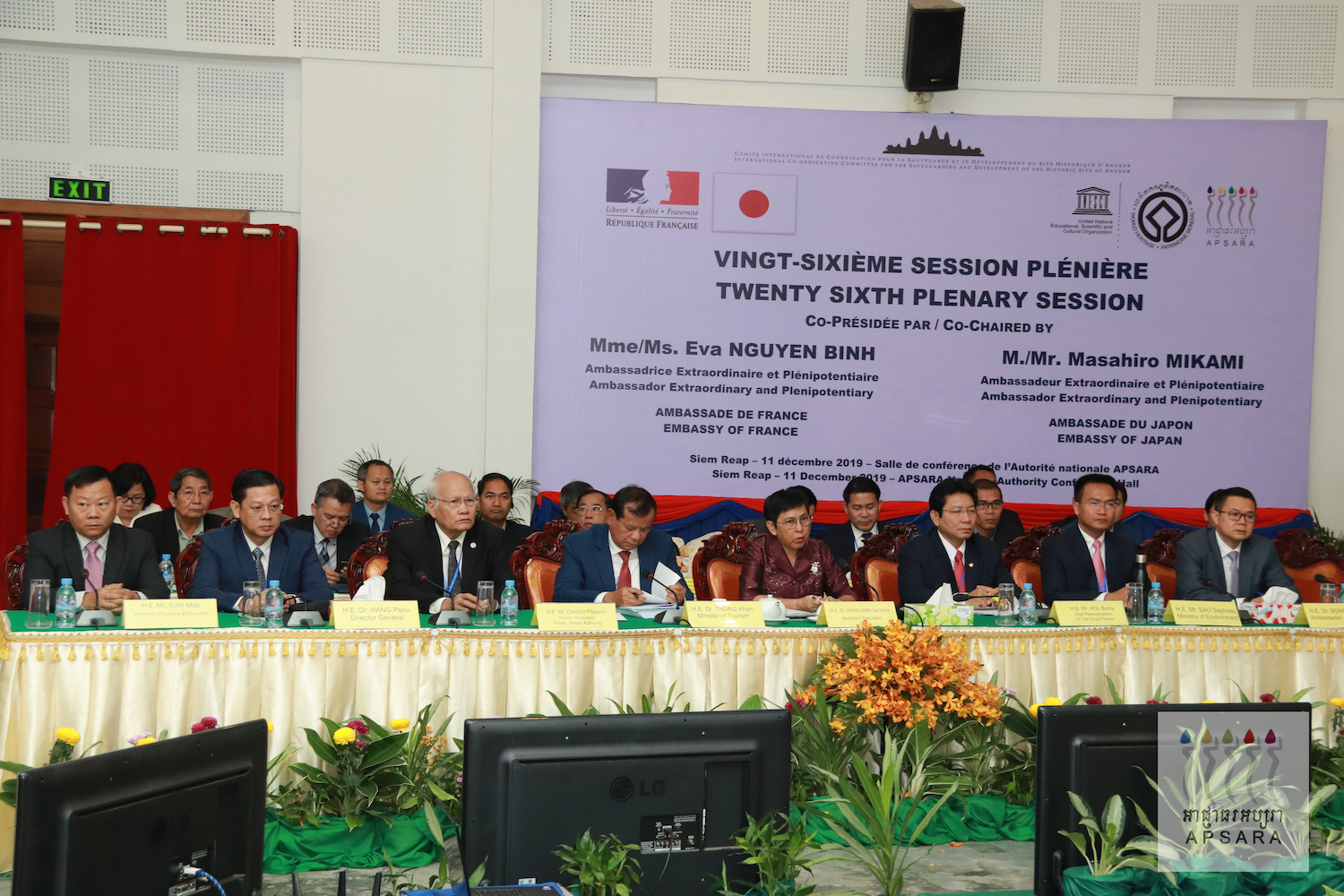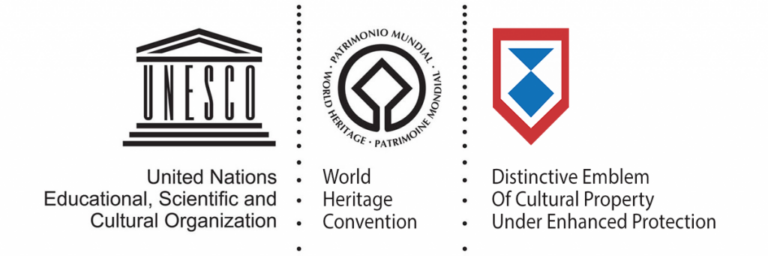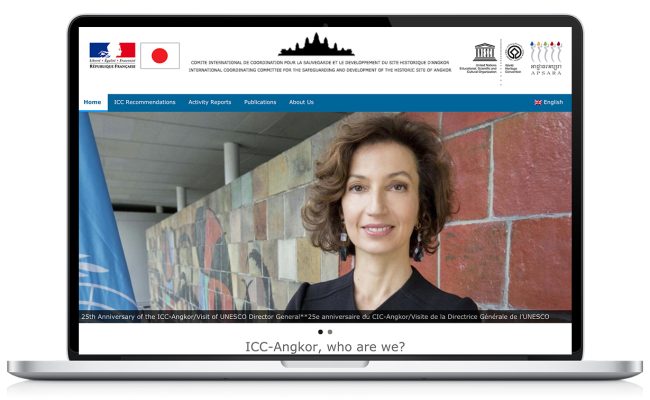- ពិធីបើកកិច្ចប្រជុំពេញអង្គនៃគណៈកម្មាធិការអន្តរជាតិអាយស៊ីស៊ី-អង្គរ និងសំបូរព្រៃគុកលើកទី៣២ -Opening Ceremony of the 32nd Plenary Session of the International Coordinating Committee for the Safeguarding and Development of the Historic Sites of Angkor and Sambor Prei Kuk - 12 December 2025
- គណៈកម្មាធិការអន្តរជាតិអាយស៊ីស៊ី-អង្គរ និងសំបូរព្រៃគុក បើកសម័យប្រជុំបច្ចេកទេស លើកទី៤១ និងកិច្ចប្រជុំពេញអង្គលើកទី៣២ -ICC-Angkor/Sambor Prei Kuk Holds 41st Technical Session and 32nd Plenary Session - 11 December 2025
- អ្នកជំនាញការអាដហុកអាយស៊ីស៊ី-អង្គរ/សំបូរព្រៃគុក បន្តចុះពិនិត្យការដ្ឋានជួសជុលប្រាសាទមេបុណ្យខាងលិច -ICC-Angkor/Sambor Prei Kuk’s Ad Hoc Experts Continue Inspections of Restoration Works at the West Mebon Temple - 09 December 2025
- អ្នកជំនាញការអាដហុកអាយស៊ីស៊ីអង្គរ/សំបូរព្រៃគុក បន្តចុះពិនិត្យកិច្ចការអភិរក្សនៅក្នុងតំបន់រមណីយដ្ឋានអង្គរ -ICC-Angkor/Sambor Prei Kuk’s Ad Hoc Experts Continue Inspections of Restoration Works at the Angkor Site - 09 December 2025
- ស្ថានទូតសហរដ្ឋអាមេរិកប្រចាំកម្ពុជារៀបចំប្រារព្ធខួប៧៥ឆ្នាំនៃទំនាក់ទំនងមមិត្តភាពកម្ពុជា-សហរដ្ឋអាមេរិក នៅខេត្តសៀមរាប -U.S. Embassy in Cambodia Celebrates 75 Years of Cambodia–U.S. Friendship in Siem Reap Province - 08 December 2025
APSARA NATIONAL AUTHORITY - SIEM REAP - KINGDOM OF CAMBODIA
ICC-Angkor

The ICC-Angkor is an international coordinating mechanism for the assistance provided by different countries and organisations for the safeguarding and development of the historic site of Angkor. In order to fulfill its role, the ICC-Angkor is kept informed about scientific projects or development operations undertaken on the site and in the Siem Reap-Angkor region. It sees to the consistency of the various projects and defines the technical and financial standards required when necessary. It highlights, when needed, any points requiring the attention of concerned parties.
ICC-Angkor stands for the International Coordination Committee for the Safeguarding and Development of Historic Site of Angkor. ICC-Angkor was set up following the first international conference about Angkor held in Tokyo, Japan on the request of the World Heritage Committee as part of its 1993 decision to inscribe Angkor as a World Heritage Site.
Creating ICC-Angkor was one of the 5 conditions that the Cambodian authorities were required to complete within 3 years (1993-1996).Some 37 countries from 5 continents and 13 international organizations participated in this founding conference of the ICC –Angkor, including: Belgium, Brunei, Cambodia, Canada, China, Denmark, Egypt, France, Greece, Germany, Great Britain, Hungary, India, Indonesia, Italy, Japan, Laos, Luxembourg, Malaysia, Mexico, Northern Ireland, Netherlands, Norway, New Zealand, Poland, Philippines, Russia, Republic of Korea, Spain, Singapore, Sri Lanka, Sweden, Switzerland, Thailand, Tunisia and Vietnam, as well as EU, ADB, FAO, IMF, ECROM, ECOM, ECOMOS, UNWTO, SEAMEO /SPAFA, UNESCO, UNDP, UNV, and WMF.
ICC-Angkor is an international mechanism to coordinate assistance offered by other countries and organizations for the Safeguarding and Development of the Historic Site of Angkor. ICC-Angkor, co-chaired by France and Japan, is a forum where the management and staff of the Apsara Authority as well as partner architects, engineers, archaeologists, researchers and technicians of different skills can exchange their views and experience for the preservation and development of Angkor.
The first decade of ICC-Angkor’s work was devoted to rescuing Angkor. This stage was followed by a decade devoted to conservation and sustainable development, while 2014 ushered in the current decade of promoting living heritage.
ICC-Angkor meetings are held twice a year and consist of both plenary and technical sessions. The Plenary Session, normally held at the end of each year, focuses on overarching policy directions; appeal for funding; validation of new projects and announcements of new projects at Angkor, while the technical sessions are held periodically to allow the technical experts to exchange their experience, discuss technical issues and sometimes propose solutions for a particular problem. The ad hoc expert group for conservation has been active since the early years of the ICC-Angkor, later joined by other ad hoc experts in sustainable development, (covering topics such as tourism management, urban planning and agriculture), who lead a very open debate process among the teams of the different countries.
In each session of ICC-Angkor, ambassadors or senior diplomats or government officials from France and Japan, co-chair the meeting. The UNESCO Office in Phnom Penh hosts the Secretariat and provides many of the costs associated with the missions of the ad hoc experts, while since 2006 the Apsara Authority has contributed to the support of ICC-Angkor. ICC-Angkor has its own rules, receives reports on scientific projects or development projects to be implemented in the region, and verifies consistency and technical standards of all projects.
The ICC-Angkor implements procedures to undertake assessments and follow-up of scientific, conservation and development projects for the Angkor site. The ICC-Angkor is coordinating the preparation of a methodological document on the ethics and practice of conservation at Angkor (conservation, showcasing and development): the Charter for Angkor.
Because ICC-Angkor has been working so well and efficiently at Angkor, UNESCO considers ICC-Angkor as a model that has served as an inspiration for others – not only in Cambodia (with the new ICC for Preah Vihear), but also in other countries, such as Afghanistan, Haiti and Iraq.
For more information, please visit ICC-Angkor Official Website :
http://icc-angkor.org/


